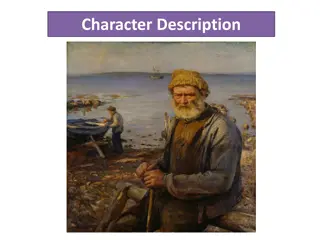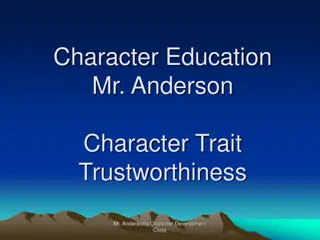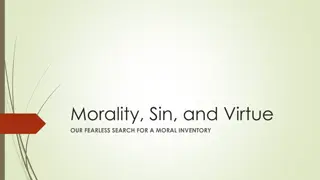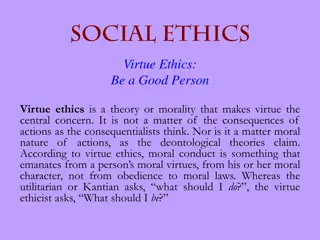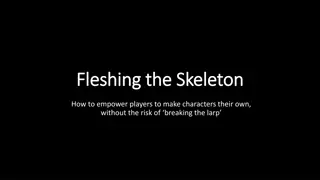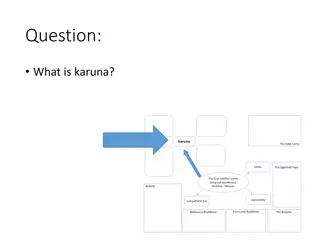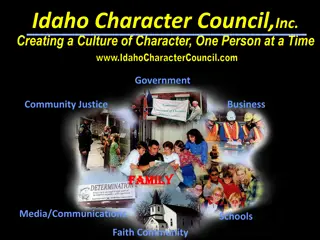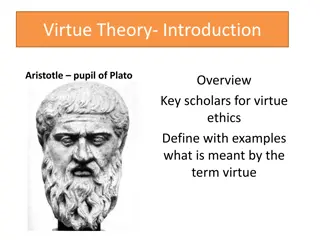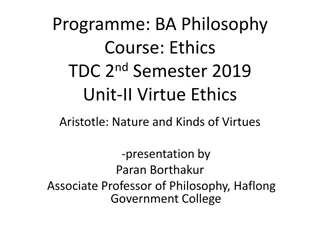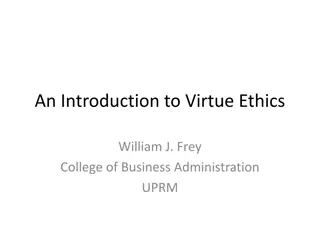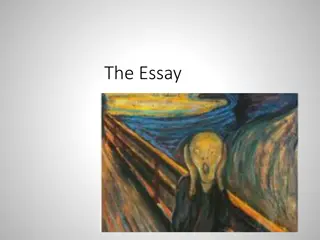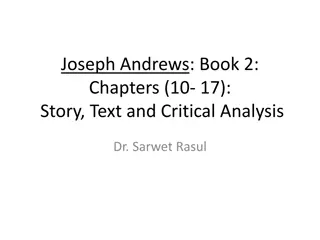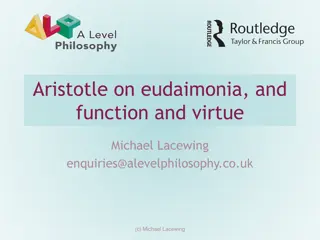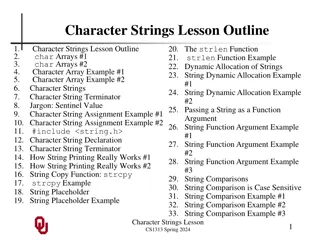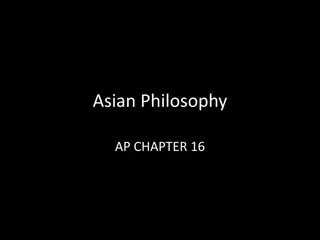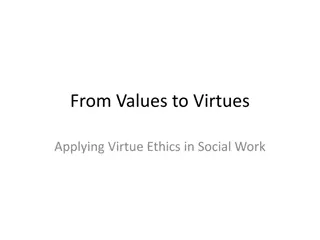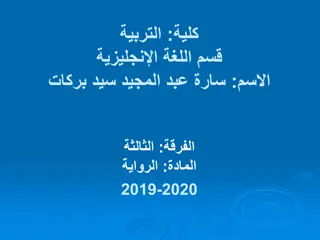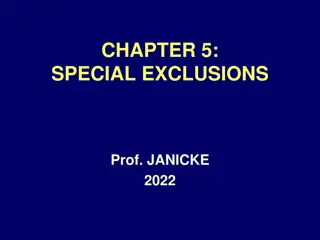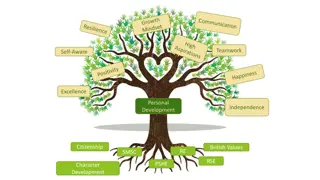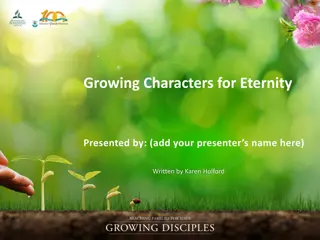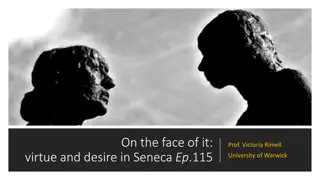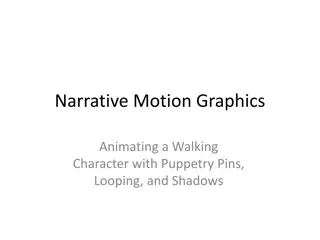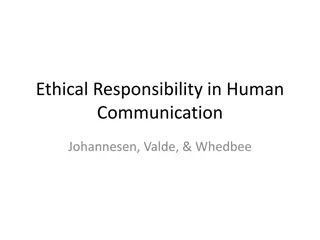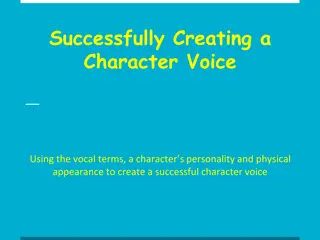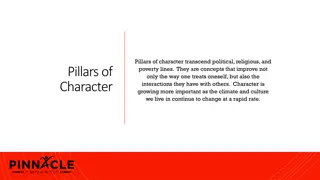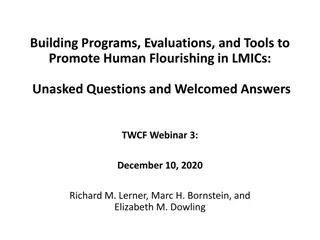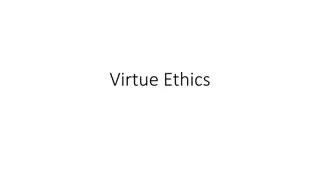Mastering Character Descriptions: Show, Don't Tell Techniques
Enhance your character descriptions by utilizing language devices such as similes, metaphors, alliteration, verbs, adjectives, and adverbs. Learn how to show rather than tell by using vivid descriptions and unique synonyms. Understand how readers infer character traits through details like name, age
0 views • 11 slides
Mr. Anderson's Character Development Class
Explore the key character traits of trustworthiness, loyalty, and integrity in Mr. Anderson's Character Development Class. Understand the definitions, examples, and associated words of these qualities to cultivate a strong moral foundation. Dive into the importance of honesty, reliability, responsib
0 views • 25 slides
Evolution of Directions on Good Character in Legal Proceedings
The significance of providing good character directions in legal proceedings has evolved over time, progressing from being discretionary to mandatory in certain situations. This presentation delves into the historical development of allowing evidence of good character, the definition of character in
2 views • 33 slides
Exploring Morality, Sin, and Virtue: A Journey of Self-Discovery
Dive into the profound exploration of morality, sin, and virtue, uncovering the essence of self-reflection and ethical understanding. From delving into the definitions of these concepts to understanding the nature of sin and virtue, embark on a transformative path towards enlightenment and inner gro
1 views • 22 slides
Understanding Virtue Ethics in Aristotle's Philosophy
Virtue ethics places virtue at the center of morality, emphasizing moral character over obeying laws or focusing on consequences. Aristotle's influence on virtue ethics is significant, highlighting the importance of striving to be a virtuous person whose actions stem from a virtuous character. Accor
6 views • 24 slides
Empowering Player Character Creation in LARP
Discover how to empower players in Live Action Role-Playing (LARP) games to create unique characters while maintaining balance and coherence within the game world. Learn about the roles of larpwrights and players in character creation, providing structure for character development while allowing spa
2 views • 9 slides
Understanding Karuna in Buddhist Philosophy
Karuna, a key virtue in Mahayana Buddhism, emphasizes recognizing and alleviating the suffering of others. Bodhisattvas exemplify this virtue through selflessness, while figures like Amitabha Buddha embody compassion through acts like welcoming believers to Sukhavati. The concept of karuna is closel
0 views • 14 slides
Understanding the Neuroscience of Habituated Motivation in Virtue Cultivation
Exploring the intersection of Aristotelian theory, cognitive neuroscience, and moral philosophy, this research delves into the conditions and mechanisms underlying the cultivation of virtuous habits through apprenticeship. By leveraging diverse expertise in philosophy, neuroscience, and cognitive sc
2 views • 21 slides
Cultivating Gratefulness: A Path to Character Development
Exploring the essence of gratefulness in fostering character development, this content delves into the importance of recognizing and appreciating the blessings and relationships in our lives. It emphasizes how experiencing lack can lead to a deeper sense of gratitude and highlights the role of chara
0 views • 17 slides
Building a Community of Character through Curriculum and Counseling at ECAP
The ECAP Counseling Plan emphasizes choosing positive actions and character for living, with a mission to encourage individuals to think of consequences before acting. The belief that one can control responsive actions to make positive decisions guides the goal of building a community of character.
0 views • 15 slides
Ethical Theories: Divine Command vs. Virtue Theory Explained
Divine Command Theory asserts that morality is derived from God's commands, contrasting with Virtue Theory which focuses on developing moral virtues to achieve human flourishing and excellence. Divine Command Theory relies on religious texts, while Virtue Theory emphasizes the cultivation of virtues
0 views • 24 slides
Understanding Virtue Ethics and Aristotle's Virtue Theory
Delve into the world of Virtue Ethics with a focus on Aristotle's Virtue Theory, exploring the concept of virtue, key scholars in virtue ethics, and the development of virtues. Discover the Golden Mean, Eudaimonia, and the Beatitudes in relation to virtue theory, alongside discussions on moral decis
0 views • 21 slides
Aristotle's Virtue Ethics: The Nature and Kinds of Virtues
Aristotle's virtue ethics discusses the nature of virtues as a disposition unique to humans that enables them to function well according to reason. Virtue involves finding the mean between excess and deficiency, not endorsing mediocrity. It emphasizes that virtues are acquired through habitual pract
1 views • 18 slides
Exploring Virtue Ethics and Human Flourishing
Delve into the realm of virtue ethics, uncovering the significance of moral education, self-excellence, and rethinking traditional moral theories. Learn how virtues shape our actions, character, and perception of ethical dilemmas, ultimately leading to human fulfillment and happiness.
1 views • 21 slides
Exploring Civic Virtue and Institutional Design in Early Modern Governance
Delve into the complexities of civic virtue and institutional design in early modern governance through a 3,000-word essay. Analyze the necessity of civic virtue within the state and consider contrasting perspectives on whether institutional design can replace it. Use primary texts to support your a
0 views • 32 slides
Understanding Foils in Literature and Media
A foil is a character in a story that contrasts with another character, often the protagonist, to highlight their qualities. It can be completely opposite or similar with a key difference. Foils are used to emphasize specific traits of the main character without being the antagonist. Examples of foi
0 views • 10 slides
Analysis of Selfishness and Virtue in Chapters 10-11 of Joseph Andrews
The text from Chapter 10 of Joseph Andrews explores themes of selfishness, materialism, and virtue as a group confronts the aftermath of an adventure. The characters argue over their shares of an 80-pound reward, revealing their self-serving nature. The chapter delves into the motivations and action
0 views • 41 slides
Understanding Aristotle's Concept of Eudaimonia and Virtue
Aristotle's philosophy delves into the concept of eudaimonia, which is not mere pleasure or wealth but the state of living well and flourishing. Eudaimonia is achieved through the exercise of virtues, qualities that aid in fulfilling one's function or characteristic activity. This pursuit of eudaimo
0 views • 10 slides
Understanding Character Strings in C Programming
Dive into the world of character strings in C programming with topics like string declaration, termination, copying functions, comparisons, and dynamic allocation. Explore how to work with character arrays and pass strings as function arguments for effective programming. Enhance your knowledge throu
0 views • 33 slides
Understanding Plot Structure and Conflict in Storytelling
Plot structure is a key element in storytelling that outlines the sequence of events in a narrative. It consists of the exposition, rising action, climax, falling action, and resolution. Additionally, conflicts drive the plot by creating tension and obstacles for the characters to overcome, such as
0 views • 13 slides
Understanding Confucius: Key Concepts and Philosophical Ideals
Confucius, born during the Zhou Dynasty, emphasized virtue, social reform, and humanism in his teachings. He focused on values like Ren (human-heartedness) and key concepts such as De (virtue) and Li (propriety). By studying human practices, he sought to achieve goodness and harmony. Explore the phi
0 views • 23 slides
Applying Virtue Ethics in Social Work: From Values to Virtues
Exploring the application of virtue ethics in social work, this content delves into the transition from foundational values to virtuous character traits. It discusses the importance of moral qualities, virtues, and practical wisdom in making ethically informed decisions. Highlighted are the perspect
0 views • 14 slides
Virtue Ethics in Bigelow's Films: A Moral Exploration
The discussion delves into the virtue ethics portrayed in Kathryn Bigelow's films "The Hurt Locker" and "Zero Dark Thirty." It raises questions on the ethics of actions taken in the war on terror, particularly the controversy surrounding the depiction of torture as crucial in the killing of Bin Lade
0 views • 12 slides
Analysis of Narrative Techniques and Character Development in Pride and Prejudice
Jane Austen's novel, Pride and Prejudice, employs a third-person omniscient narrator to provide insights into character perspectives, particularly focusing on Elizabeth Bennet. The narrative techniques reveal different viewpoints and character depths, while the character analysis of Mr. Bennet showc
0 views • 10 slides
Understanding the Factors Influencing Character Development
Exploring the concept of character development, this content delves into the Greek origin of "Charasso," meaning a distinguishing mark or quality. It discusses the factors shaping our character, from natural influences like heredity and upbringing to spiritual factors like Christ, the Fruits of the
0 views • 27 slides
Understanding Special Exclusions in Character Evidence Law
Explore the nuances of character evidence in legal contexts through Professor Janicke's insights on special exclusions, including the limitations and exceptions in civil and criminal cases, the reasons character evidence is often disallowed, and the application of Rule 404(b) for specific circumstan
0 views • 48 slides
Comprehensive Character Development Program at Ratby Primary School
Rich and varied experiences at Ratby Primary School foster personal development, independence, and excellence. Emphasis on teamwork, citizenship, and British values. Focus on RSHE, SMSC, and PSHE for holistic character development, ensuring physical and mental well-being alongside academic achieveme
0 views • 13 slides
Strengthening Character Traits for Eternal Growth
Explore the concept of character strengths through a spiritual lens, focusing on qualities like love, joy, and perseverance. Reflect on God's character to identify strengths to develop in becoming more like Him. Develop character traits with guidance from 2 Peter 1:5-8 and nurture your own strengths
0 views • 13 slides
Automatic Discovery of Character Infoboxes from Books - CharBoxes System
The CharBoxes system aims to automatically discover character infoboxes from books, assisting in effective summarization, marketing, and understanding of book characters. By extracting important character details, constructing social graphs, summarizing character-centric text, and more, CharBoxes en
0 views • 20 slides
Exploring Virtue and Desire in Seneca's Philosophy
Seneca presents a nuanced version of Stoicism, allowing for human interaction and love while emphasizing the purity of love separate from bodily desires. Through Seneca's writings, the distinction between love and desire is made clear, touching on themes of body, mind, desire, and veneration. The in
0 views • 15 slides
Understanding Character Development in Mango Street
Explore the character dynamics and transformations in Mango Street through the analysis of foils, character comparisons, and thematic connections with Greek mythology. Delve into Esperanza's growth and experiences as you prepare for an upcoming test on the book's key themes and character development
0 views • 13 slides
Animating a Walking Character with Puppetry Pins and Shadows
Delve into the art of character animation using puppetry pins and shadows in Narrative Motion Graphics. Learn the step-by-step process of creating a walking character, setting up pins for movement, animating key poses, and looping the animation seamlessly. Enhance your skills in character animation
0 views • 6 slides
Understanding Ethical Responsibility in Human Communication
Ethical responsibility in human communication entails making judgments on rightness, wrongness, virtue, and obligation. It explores the importance of choice, coercion, and the distinction between morals and ethics. The text delves into relativism, ethical ramifications in communication, and the prac
0 views • 9 slides
Mastering Character Voice Creation
Explore the art of creating a character voice by understanding vocal terms, personality traits, and physical appearance. Learn how pitch, quality, rate, emphasis, inflection, and articulation shape a character's voice. Dive into developing character personality, traits, and sharing insights for effe
0 views • 13 slides
Importance of Character Development and Pillars of Character
Character development is crucial in today's ever-changing world, transcending political, religious, and poverty lines. The pillars of character, such as empowerment, excellence, enthusiasm, balance, self-control, teamwork, and more, play a significant role in shaping individual interactions and beha
0 views • 19 slides
Uncovering Character Development in "Starseeker: Tim Bowler - Chapter Insights
Delve into the intricate character developments in the novel "Starseeker: Tim Bowler" through thought-provoking lessons, detailed character analysis, and engaging activities. Explore the depths of Luke, Speed, Skin, and Daz as you unravel their personas and journey through their evolving narratives,
0 views • 43 slides
Understanding and Promoting Human Flourishing in LMICs: Insights from TWCF Webinar Series
Explore the discussions on character virtue development, program design, and evaluation in low- and middle-income countries (LMICs) from the TWCF webinar series led by Richard M. Lerner, Marc H. Bornstein, and Elizabeth M. Dowling. Discover valuable insights on reliability, validity, and the use of
0 views • 67 slides
Insights into Virtue Ethics and Critiques of Kantian Morality by Philippa Foot
Philippa Foot, a key figure in the modern revival of Aristotle's virtue ethics, critiques the Kantian approach to morality. She emphasizes the importance of motivation in cultivating virtues, arguing that feeling bound by morality stems from wanting to lead a flourishing life. Through her works, Foo
0 views • 14 slides
Federal Character Principles in Tertiary Institutions: Implementation, Implications, Challenges
Dr. Shettima Bukar Abba Ag., Executive Chairman of the Federal Character Commission, presented a paper on the implementation, implications, and challenges of Federal Character principles in tertiary institutions at a retreat organized by the National Commission for Colleges of Education. The histori
0 views • 26 slides
Forms of Moral Reasoning and Ethics in Decision-Making
Explore the main forms of moral reasoning in ethical decision-making, including virtue ethics, deontological reasoning, and teleological reasoning. Understand the importance of developing ethical virtues and principles in guiding behavior. Delve into examples of reasoning from virtue and deontologic
0 views • 28 slides
